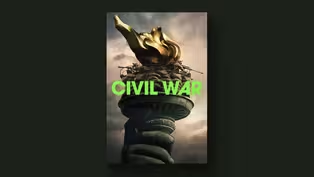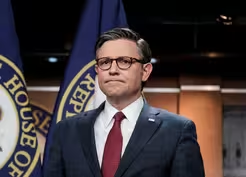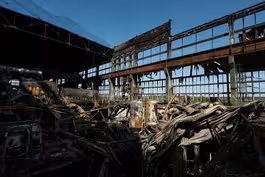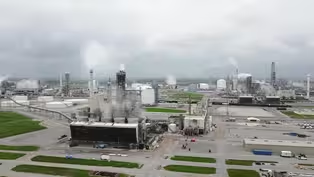
Supreme Court weighs obstruction charge in Jan. 6 cases
Clip: 4/16/2024 | 4m 15sVideo has Closed Captions
Supreme Court questions use of obstruction law in Jan. 6 cases
The Supreme Court heard arguments on Tuesday in a case looking at an obstruction law used to prosecute hundreds of Jan. 6 rioters. The obstruction statute is also key to various legal challenges facing former President Donald Trump. Geoff Bennett discussed more with Politico’s Kyle Cheney, who has been following the Jan. 6 legal fallout.
Problems playing video? | Closed Captioning Feedback
Problems playing video? | Closed Captioning Feedback
Major corporate funding for the PBS News Hour is provided by BDO, BNSF, Consumer Cellular, American Cruise Lines, and Raymond James. Funding for the PBS NewsHour Weekend is provided by...

Supreme Court weighs obstruction charge in Jan. 6 cases
Clip: 4/16/2024 | 4m 15sVideo has Closed Captions
The Supreme Court heard arguments on Tuesday in a case looking at an obstruction law used to prosecute hundreds of Jan. 6 rioters. The obstruction statute is also key to various legal challenges facing former President Donald Trump. Geoff Bennett discussed more with Politico’s Kyle Cheney, who has been following the Jan. 6 legal fallout.
Problems playing video? | Closed Captioning Feedback
How to Watch PBS News Hour
PBS News Hour is available to stream on pbs.org and the free PBS App, available on iPhone, Apple TV, Android TV, Android smartphones, Amazon Fire TV, Amazon Fire Tablet, Roku, Samsung Smart TV, and Vizio.
Providing Support for PBS.org
Learn Moreabout PBS online sponsorshipAMNA NAWAZ: Welcome to the "NewsHour."
Here in Ukraine,as leaders await news of# additional U.S. aid, Russia's war here## has entered a new phase, now attacking Ukraine's# energy infrastructure with devastating precision.
But, first, we begin at home,## where the U.S. Supreme Court heard oral# arguments today in a case about January 6.
GEOFF BENNETT: And those arguments focused# on whether part of a federal obstruction## law can be used to prosecute some of the# rioters involved in the January 6 attack## on the U.S. Capitol.
The court's ruling# could impact hundreds of criminal cases,## even the pending case against# former President Donald Trump.
Kyle Cheney, Politico's# senior legal affairs reporter,## has been following the January 6# legal fallout and he joins us now.
Kyle, thanks so much for being with us.
We should say, this case was brought by a former# Pennsylvania polic.. who was charged with multiple crimes for# pushing his way into the U.S. Capitol on## January 6, 2021.
Walk us through the# arguments the justices heard today.
KYLE CHENEY, Senior Legal Affairs# Reporter, Politico: So Fischer's## challenge to this obstruction law,.. simple.
This law was passed after the Enron# scandal in 2000.
It was meant to stop people## from tampering with evidence in a court-like# proceeding or a congressional proceeding,## not envisioned to cover the sort of# riotous conduct that we saw on January 6.
So he may be culpable for a lot of stuff# on January 6, but this obstruction charge,## which, by the way, has a 20-year maximum sentence,## he says that should not apply# to him or his fellow rioters.
GEOFF BENNETT: And the Supreme Court's# conservative majority seemed skeptical## of the Justice Department's position.
Help# us understand why they seemed dubious of the## DOJ's broad reading of this obstruction law.
KYLE CHENEY: So what DOJ essentially has said is,## actually, no, Fischer's wrong.
This law was# passed by Congress as a catch-all.
It should## apply to all kinds of obstructive conduct.# They missed some stuff that Enron was doing.## They wanted to make sure they didn't# miss anything again.
So we can sweep## in all of this stuff that happened after# January 6 as part of that broad umbrella.
And the justices, the conservative justices,# in particular, were very skeptical about how## broadly DOJ viewed it.
Could it sweep in# all kinds of -- someone who stands up and## interrupts the Supreme Court, could that# person be charged with a 20-year felony?
And DOJ said, no, no, no, it's much# tougher than that.
You have to prove## someone had corrupt intent, which# is a very difficult thing to prove,## that they knew what they were disrupting and# did it on purpose.
But the justices seemed to## worry about how it could be applied# and how widely it could be applied.
GEOFF BENNETT: Meantime, some 350 people# have been charged with obstructing an## official proceeding for their part# in the Capitol attack.
More than 100## people have already been convicted# and are serving prison sentences.
What might the outcome of the Supreme# Court's ruling mean for those cases?## And what might it mean for Donald Trump, who# is also charged with the obstruction crime?
KYLE CHENEY: If the Supreme Court# rules as narrowly as it might,## it could upend all of those cases# that we describe, those 350 cases.
I mean, if you have already served your# sentence, you're kind of out of luck.## But if you're a serving or about to serve a# sentence, it could totally change the game## for you and you could be on the hook# for misdemeanors, instead of a felony.
As for Donald Trump, the question is, did# his actions to send fake electors to Congress## count as the same type of obstruction# that this law was meant to cover?
So,## again, how the justices read that could read the# charges against Donald Trump right out of special## counsel Jack Smith's case or it could preserve# it depending on how narrowly they construe it.
GEOFF BENNETT: So, the special counsel,## is he planning potentially for an outcome that# co.. KYLE CHENEY: He is.
And he actually previewed# his thinking on this in a recent Supreme## Court filing in the presidential immunity case# that's coming up with the justices next week.
But his argument essentially is that,# even under the narrowest interpretation## that the Supreme Court might# take of the obstruction law,## Donald Trump's conduct still fits squarely# within it because, by sending fake elector## certificates to Congress, that's exactly the# type of evidence tampering that Congress is## worried about when they passed this law# in the aftermath of the Enron scandal.
GEOFF BENNETT: Kyle Cheney with Politico,## thanks so much for sharing your reporting# and your ins.. KYLE CHENEY: Good to be with you, Geoff.
'Civil War' explores a divided America at war with itself
Video has Closed Captions
Clip: 4/16/2024 | 7m 26s | New film 'Civil War' explores a divided America at war with itself (7m 26s)
Johnson faces threat to speakership over aid plans
Video has Closed Captions
Clip: 4/16/2024 | 8m 10s | Johnson faces another threat to speakership over Ukraine and Israel aid plans (8m 10s)
Russian attacks on power plants ravage Ukraine energy system
Video has Closed Captions
Clip: 4/16/2024 | 7m 5s | How recent Russian attacks on power plants have ravaged Ukraine’s energy system (7m 5s)
Study links petrochemical plants to poor birth outcomes
Video has Closed Captions
Clip: 4/16/2024 | 8m 59s | Study links petrochemical plants in Louisiana to premature and low-weight births (8m 59s)
Sudan humanitarian crisis worsens after 1 year of civil war
Video has Closed Captions
Clip: 4/16/2024 | 10m 12s | Sudan marks 1 year of brutal civil war as humanitarian crisis worsens (10m 12s)
Providing Support for PBS.org
Learn Moreabout PBS online sponsorship
- News and Public Affairs

FRONTLINE is investigative journalism that questions, explains and changes our world.

- News and Public Affairs

Amanpour and Company features conversations with leaders and decision makers.












Support for PBS provided by:
Major corporate funding for the PBS News Hour is provided by BDO, BNSF, Consumer Cellular, American Cruise Lines, and Raymond James. Funding for the PBS NewsHour Weekend is provided by...




